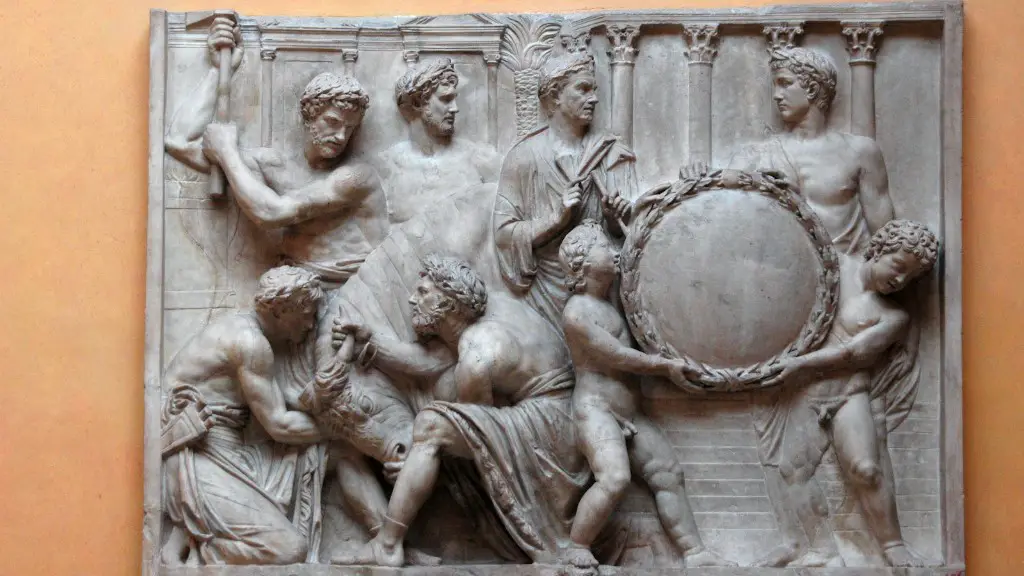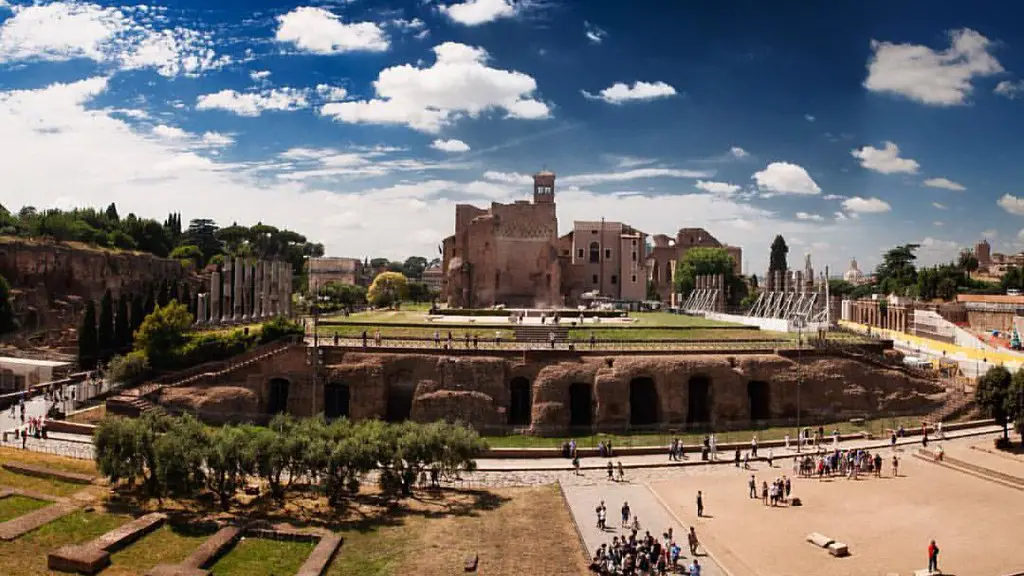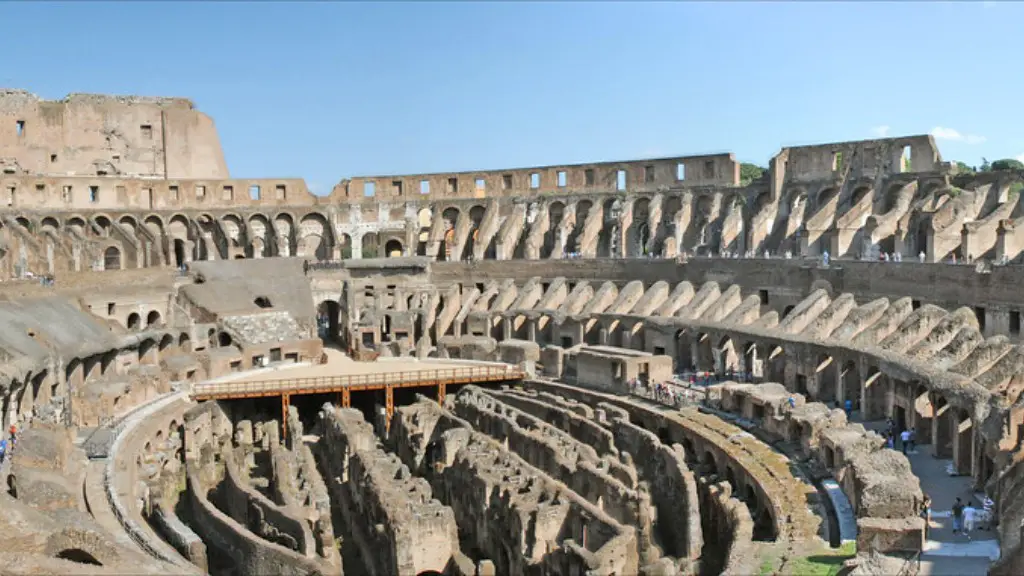Christianity was first introduced to Ancient Rome during the early first century. This movement was met with resistance and hostility by the Roman imperial and religious establishments. Despite persecution, the Christian Church survived and, toward the end of the fourth century, Christianity was officially recognized in the Roman Empire.
In the beginning, Christianity was viewed as a foreign, potentially dangerous, and largely misunderstood religious movement, given that many of its status symbols and theologies clashed with traditional Roman religious and cultural values. Roman society at this time was polytheistic and henotheistic, with the Imperial Cult being polytheistic in nature, and Christian doctrine was presented as a unique and exclusive religion by the Church’s founders.
The earliest form of Christianity in Ancient Rome consisted of small, local congregations that met in homes of believers or in makeshift places of worship such as the catacombs. Christian meetings were often raided by authorities, and the congregants would be persecuted or executed. This resulted in the steady growth of Christianity, since it was regarded as a secret, underground religion that could not be stamp out.
The rise of Christianity in the Roman Empire was primarily due to the efforts of early Church leaders and missionaries, who spread the teachings of Jesus Christ and shared stories of his miracles throughout the empire. These missionaries preached to pagan worshipers and attempted to convert them. Emperor Constantine was also instrumental in the spread of Christianity, famously proclaiming religious toleration for Christians in the Edict of Milan in 313 CE.
It was during the reign of Emperor Milan that Christianity quickly gained a foothold in the Roman Empire. In 325 CE, Emperor Constantine convened the First Council of Nicea, which was a formal gathering of Christian clergy and bishops from throughout the empire. In this council, the Church authoritative doctrines and practices of the faith were established. By 380 CE, Christianity was adopted as the official state religion of the Roman Empire.
The adoption of Christianity in Ancient Rome brought many benefits. Firstly, it established an ethical system of moral values and a unified belief system that was shared by virtually all citizens. This helped to bind the Roman Empire together, while also providing a moral framework on which to base laws and regulations.
Moreover, Christianity provided solace to victims of natural disasters, such as the plague and famine. By proclaiming all people were equal in Christ’s eyes, Christianity promoted a sense of equality among all citizens regardless of their ethnicity, gender, or social status. Finally, Christianity undoubtedly played an important role in helping to preserve the Greco-Roman literary and literary heritages.
Preservation of Greco-Roman culture
Prior to Christianity, the vast majority of religious concepts had been based in polytheism and paganism. Christianity presented the concept of a single all-powerful God, which was a radically new idea to the Greco-Roman culture. Christianity also provided a moral and ethical code to live by and a unification of social values which helped to bring a newfound unity and purpose to the Roman people.
The Church also provided a force of moral guidance in the Greco-Roman world, helping to revive and preserve the Greco-Roman culture. This was done primarily through the preservation of much of the Greco-Roman literary and philosophical works, which were deemed to be part of the Christian faith. This allowed much of the Greco-Roman culture to survive and be passed down through the generations, despite the often-destructive forces of political and imperial turmoil that would periodically ravage the region.
Moreover, Christianity’s emphasis on education and learning made it the perfect vehicle for the spread of the Greco-Roman culture. Christianity was seen as a superior religion to paganism and polytheism, and its followers sought to learn and promote it in order to bring the Greco-Roman world and its culture into alignment with the new faith.
Finally, the Church provided a safe haven for the Greco-Roman culture and traditions, with Christian priests and leaders preserving much of the literary works and philanthropic works of their Greco-Roman counterparts. This allowed the Church to effectively act as a unifying force and a vehicle of preservation, helping to protect and sustain many of the beloved Greco-Roman artistic, literary, and cultural works.
Impact of Social Change
Christianity’s adoption by Ancient Rome was not just a religious, but a social and political event as well. Christianity brought with it a new sense of social unity and solidarity, providing a source of moral justifications for laws and clearly defined values. Christianity made a significant impact on the social mores of Ancient Rome, as it brought about a fundamental shift in the way people interacted with one another and in the roles in which men and women were expected to take.
Christianity’s views on poverty, mercy, charity, and justice were particularly influential. Christianity sought to impose a common code of ethics and morality on its followers, while also providing a sense of comfort and security in difficult times. As Christianity gained popularity, the Roman state began to offer social welfare, higher levels of education, and improved public health infrastructure. Christianity also established a wider framework of religious toleration and peace, resulting in increased civil liberties and dignity for both women and children.
Christianity also had an effect on gender roles in Ancient Rome. For example, women were given more prominence in Christian culture than their pagan counterparts, and the Church provided greater access to education for women. This resulted in a more equitable power dynamic between men and women in the Ancient Roman world, as Christianity sought to provide equal opportunities for both genders.
In a larger sense, Christianity helped to bring about a greater sense of justice, mercy, and charity. All citizens, regardless of social class or wealth, had an equal chance to make a moral and dignified life for themselves, freed from the strict Roman paternalistic structures. In addition, Christianity encouraged social cooperation, with individuals helping and looking out for their less fortunate neighbors. This promoted a more harmonious society in Ancient Rome that valued its citizens and provided greater support for the poor and vulnerable.
Effects on Ancient Roman Government
Christianity was also a major political force in Ancient Rome, as it lent its principles of mercy and justice to the political system. The Church put pressure on the Roman government to provide social services, such as food relief, welfare, and education. Moreover, Christianity condemned slavery and sought to end corporal punishment and the death penalty. This resulted in the government establishing new laws that provided greater civil liberties.
Moreover, by proclaiming a single, all-powerful god, Christianity united the various religious cults and traditions of the Roman world into one unified faith, which served to further unify the empire. The Church also served as a check on the powers of the state, ensuring that the government abided by its religious and moral principles. Christianity gave the people of Ancient Rome a new sense of purpose, direction, and community.
The spread of Christianity allowed a certain degree of freedom to the people of the Roman world, particularly the underprivileged and marginalized. This resulted in an improved quality of life, with citizens enjoying greater liberties, with the Church acting as an intermediary between the people and their government, promoting justice and equity across the empire.
In conclusion, it is clear that Christianity had a huge impact on both the social and governmental systems of Ancient Rome. Its adoption by the Roman Empire had far-reaching implications, not just in terms of religious unity, but in terms of providing a newfound sense of justice, equity, and peace to the Roman world.
Urbanization Theories
One of the theories that has been presented to explain the embrace of Christianity in the Roman Empire is the concept of urbanization. This theory argues that Christianity’s spread was aided by the growth of cities, as the urban populace was more open to religious change.
In the Roman world, the urban economiy was the primary engine of change. Cities were vibrant centers of trade, commerce, industry and culture, and since these areas were more open to religious and cultural influences, they tended to be more receptive to the introduction of Christianity.
Cities also provided new opportunities for religious expression, as Christian believers could meet in relative anonymity in sprawling urban areas. The spread of Christianity in the Roman world was thus aided by the rise of cities, as the increased population and economic activities provided fertile grounds for the spread of the faith.
Urbanization was also a religious phenomenon that had a dramatic impact on Christianity’s spread. By appealing to the needs of urban inhabitants, Christianity could quickly gain a foothold in a new city, which helped to spread the faith throughout the Roman Empire.
Furthermore, Christianity also benefited from the emergence of a new class of merchant-manufacturers in the Roman world, who held considerable economic and political power. This merchant class was more open to new ideas, and thus helped to facilitate the spread of Christianity throughout the empire.
Political Factors
Political factors were also crucial in the spread of Christianity in the Roman Empire. Political stability, the idea of the divine right of emperors, the presence of influential Christian leaders, the Edict of Milan, and Constantine’s conversion are all important considerations when it comes to the story of Christianity in Ancient Rome.
The idea of the divine right of emperors saw pagan religions no longer receive state funding, marking a distinct shift from the traditional Greco-Roman religious practices. As the idea of a one true God began to be accepted, it was important for the Roman Empire to gain support from influential Christian leaders and have Constantine’s conversion as an example of Christian commitment.
The Edict of Milan in 313 CE officially declared that Christians were free to practice their religious beliefs throughout the Roman Empire. This opened the gates for Christianity to become firmly entrenched in Roman society. With the power of political backing, Christianity grew and flourished, with the Roman Church having an increasingly larger presence in public life.
Moreover, Constantine’s conversion (without any consideration of political or personal interests) to Christianity provided a powerful example to the populace and demonstrated to the world that the Christian faith was no longer considered a fringe movement, but an accepted and respected belief system.
Finally, political reforms of Emperor Julian the Apostate, combined with the theological debates taking place throughout the late fourth century, helped to further solidify Christianity’s hold on the Roman Empire. By 380 CE, Christianity was declared the official state religion of the Roman Empire, and over time it spread throughout Europe, Africa, the Middle East, and eventually the entire world.





